The Amish in Maine: 2023 Guide (11 Communities)
New England has historically seen little Amish settlement, with Amish mostly avoiding the region. Maine, however, is one exception to that story. Amish have steadily founded new communities in the state, growing from just three settlements in 2010, to 11 communities today (2023).
Maine Amish Locations
Amish can be found in four locations in Aroostook County – including long-established communities at Smyrna and Fort Fairfield, near the Waldo County town of Unity, and in five other counties in the Pine Tree State.
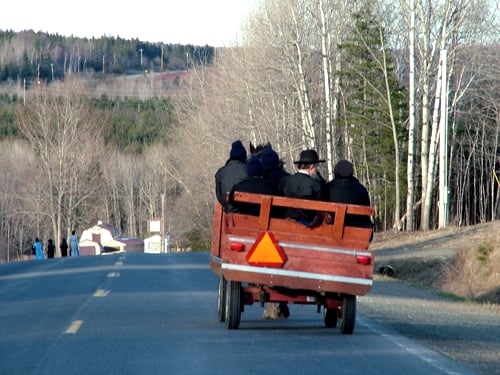
Smyrna
The oldest Maine Amish community is located in Aroostook County in the area of Smyrna (Smyrna Mills). This settlement was profiled in a piece in the Boston Globe in 2005. The town of Smyrna itself is described as a “rugged town of potato farmers and loggers, notable for its fierce winters and solitary general store” and “a remote place with little allure for outsiders.” (“Putting Down Roots: Amish find a home in rugged Maine”, Boston Globe, Sarah Schweitzer, February 2, 2005).
However the area has held enough allure to keep Amish around, with families hailing from states as varied as Tennessee, Michigan, Iowa and Maryland making up the settlement. The community remains small at one congregation in size. In describing why they came to the area, an early settler explained: ”We wanted to be in an uncontaminated community”…”One less populated with plain people” (“Putting Down Roots”).
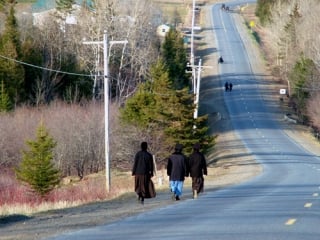
The path this group took to being considered part of the Old Order Amish today is unusual. Individuals comprising a church somewhat like the Amish, but with key differences leaving them outside the Amish fold, first came to the Smyrna area in 1996.
Following internal change, the group eventually did affiliate with the Old Order Amish in 2000, which may be considered the founding date for this settlement as an Amish community (personal correspondence Stephen Scott; see also Bryce Geiser, “The Christian Communities: A Brotherhood of Covenant and Commitment,” Old Order Notes, 321 Spring Summer 2000).
Amish in Smyrna created a range of businesses, including greenhouses, a furniture shop, bicycle center, a horse breeder, as well as more traditional farms (read more on Maine Amish furniture). The community, along with the settlement at Unity (see below) is considered to be a part of the reformist “Michigan Circle” Amish churches. Today (2023) around 120 Amish people live here.
Fort Fairfield
A second Maine Amish community can be found near the town of Fort Fairfield, also in Aroostook County. Karen Johnson-Weiner notes that a group of conservative “Joe Troyer” Swartzentruber Amish left the Heuvelton, NY Amish settlement in 2007 in order to found a settlement in Maine (see New York Amish, p. 60). The community has grown to become the state’s largest, at nearly 300 people as of 2023.
Amishman Noah Yoder explained that he had spent two years searching for the “ideal place” to relocate. “What drew us to the area was the beautiful scenery, availability of farmland and some of the nicest people we’ve ever met. We’ve been well-accepted here and appreciate that.” (“Fort Fairfield and Easton Welcome Amish Families to Their Communities”, Fort Fairfield Journal, David Deschesne).
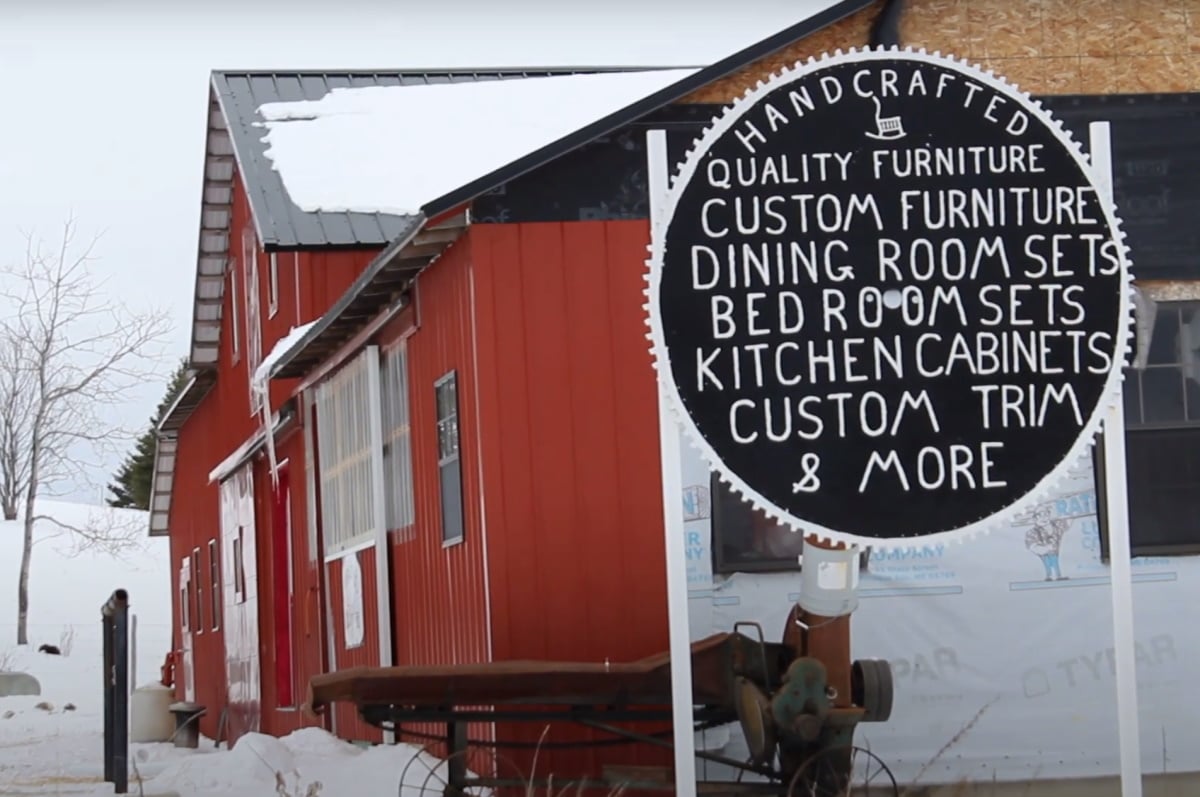
The Fort Fairfield Amish are known as Swartzentruber Amish, one of the most traditional of all groups. Amish in this very plain group supplement their farming with small businesses, including a dry goods store and furniture (“Amish in Fort Fairfield”, March 17, 2011, WLBZ2).
Members of the community harvest ice in winter for cooling, forgoing the liquid propane-powered refrigerators used by Amish in more progressive communities. Visitors to the area should also take care as this group rejects the orange slow moving vehicle triangle as well as electric buggy lights, in favor of reflective tape and relatively dim lanterns.
Sherman/Island Falls
The state’s second-largest Amish settlement is also found in Aroostook County, in the area of Sherman and Island Falls. This community was settled in 2011, and has grown to over 200 residents. In the community can be found traditional farms, produce and farm stands.
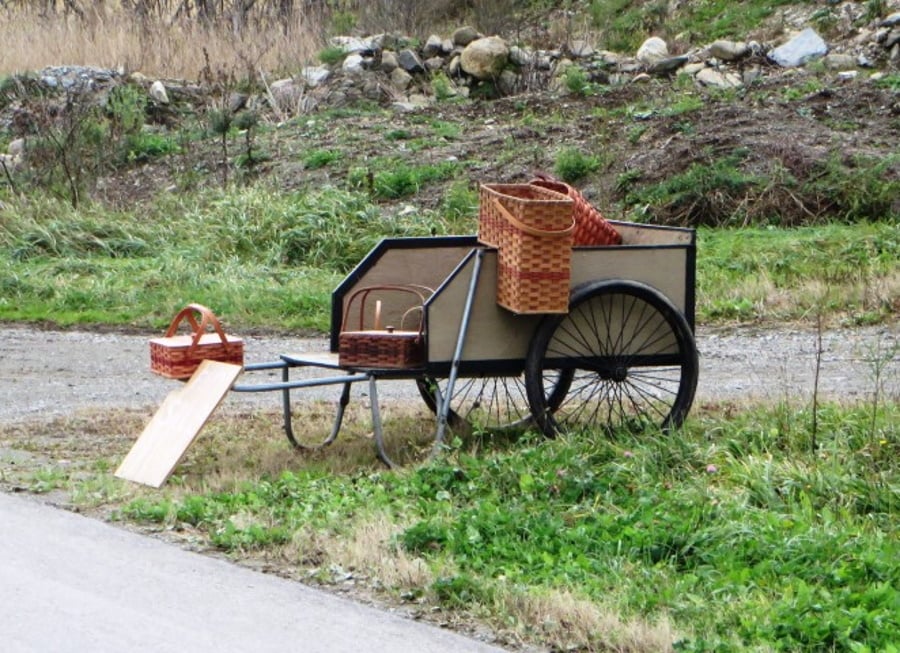
Unity
The atypical Amish settlement at cheerily-named Unity (Waldo County) was founded in 2008. Some families arrived at this location from the settlement near the town of Smyrna in Aroostook County. Other areas contributing settlers included Amish settlements in Missouri and Kentucky. Around 150 Amish call the Unity area home as of 2023.
The Amish have cooperated with locals and have opened small businesses, including wood shops and food outlets. “We’ve been welcomed by the community. The community has been what we expected. They’ve welcomed us and helped us any way they can,” explained Ervin Hochstetler, Deacon of the Unity church, not long after their arrival. “Farmers have a lot in common, although our method of farming would be quite different than most farms.”(“Amish families reviving farms in Thorndike, Unity”, Bangor Daily News, Walter Griffin, October 23, 2009). Since that time, the Amish have become valued neighbors and members of the general community.
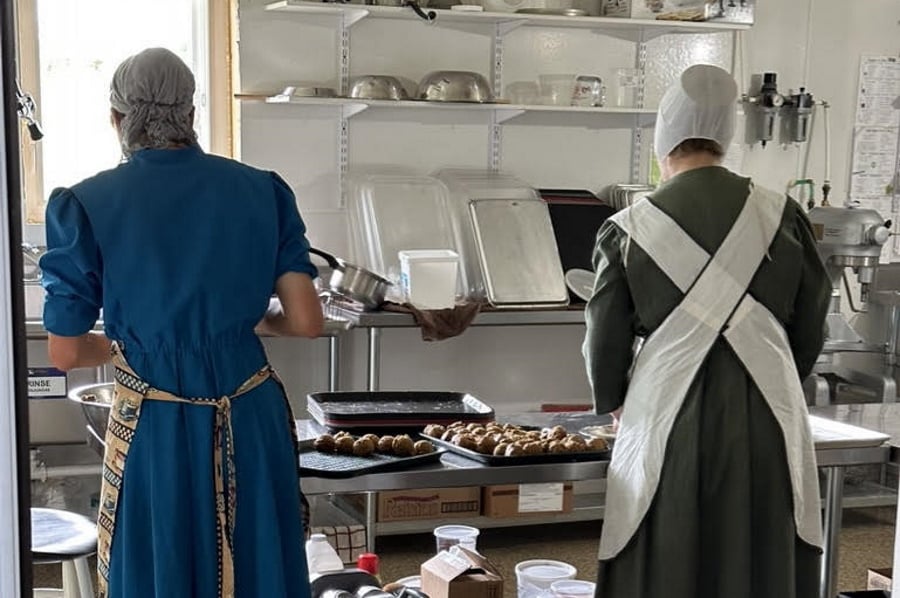
Among the community’s Amish-run businesses, the best-known of which is arguably the Community Market and Bakery (368 Thorndike Road). This mainstay features donuts twice a week (Wednesday and Saturday) which are especially popular with the locals. The market burned down in early 2022, but was rebuilt and reopened later that year.
Also well-known is Charcuterie, a gourmet cured meats and cheeses shop. The owner, Matthew Secich, is a convert to the community and a former Chicago chef.
The background of Charcuterie’s owner hints at one of the things that makes this community “atypical”. The Unity settlement has a generally different outlook towards outsiders than the typical Amish community. While most Amish do not encourage converts, the Amish at Unity are considered “seeker-friendly”, and have attracted a number of them over the years.
Another element that makes the Amish here stand out is visual: men generally do not shave their upper lips in this settlement, in sharp contrast to common Amish custom.
Whitefield
The area of Whitefield in Lincoln County saw its first Amish settlers in 2017. This community has an interesting origin story: A local non-Amish couple wrote a letter to Amish in New York, encouraging them to consider settling in the Whitefield area. The couple, Pat and Robin Chase, even drove overnight 10 hours to an Amish household in New York to make the point.
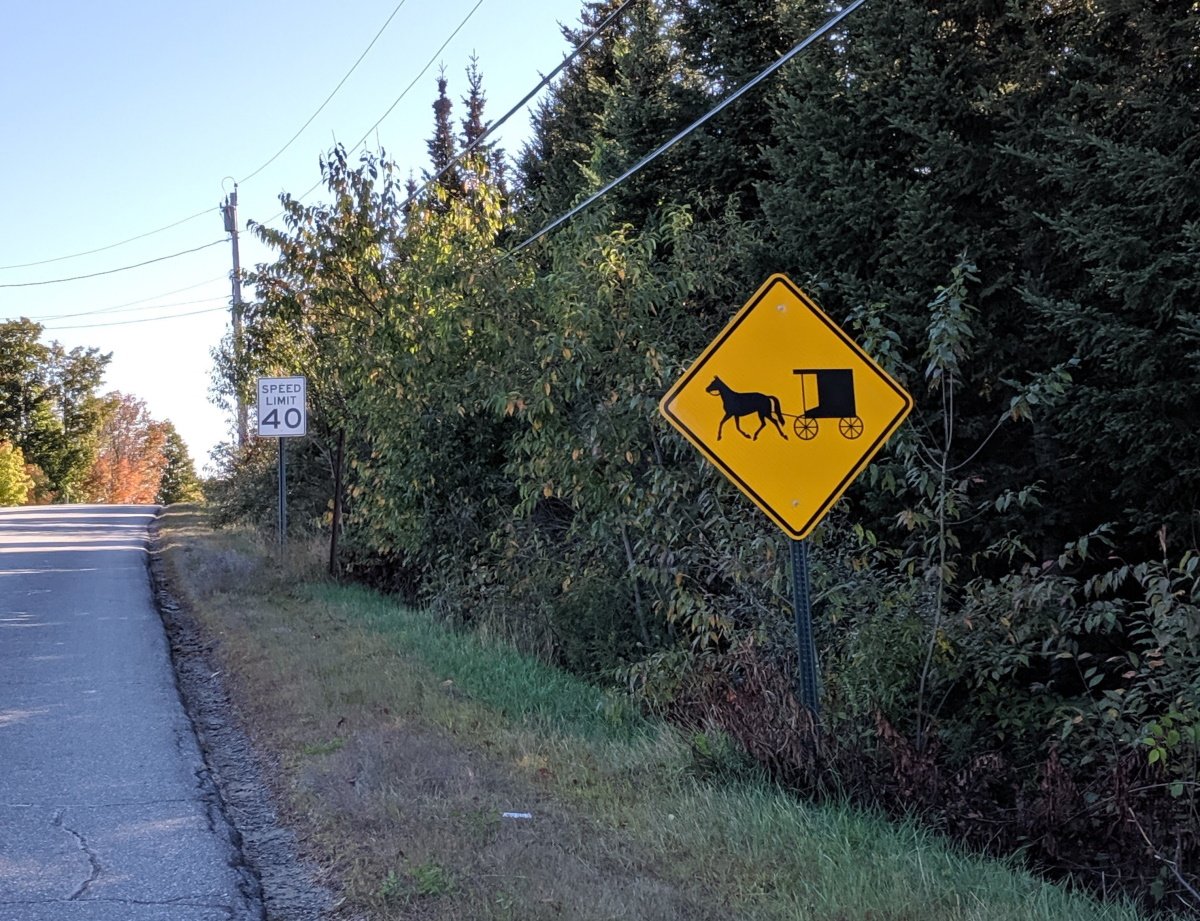
Yellow buggy warning signs quickly went up in the Whitefield area, and a potluck meal welcomed one family’s arrival. The warm welcome and assistance has led to this Amish community growing to well over 100 people in size.
Other Amish Settlements in Maine
Two settlements are found in Somerset County – one at Palmyra, founded in 2020, and a second near Mercer, founded in 2022. Both communities are relatively small in size. The year 2020 also saw the founding of Amish settlements at Hiram in Oxford County, and at Wales in Androscoggin County. Both remain a small size at just a handful of Amish residences each.
Finally, a conservative Swartzentruber Amish settlement was recently established in the area of Corinth (Penobscot County). The community, which numbered just a few families in 2022, has tripled in size in just a year’s time.
Warm welcome for more Amish in Maine?
Amish have generally found a warm welcome in Maine. Harsh climate and distance likely discourage Amish from settlement, but the relatively cheaper land prices and low population typical of the state are pluses for many Amish when considering a new location.
Additionally, Maine is no longer the only New England state with an Amish presence, either. In 2015, Amish put down roots in Vermont’s Northeast Kingdom.
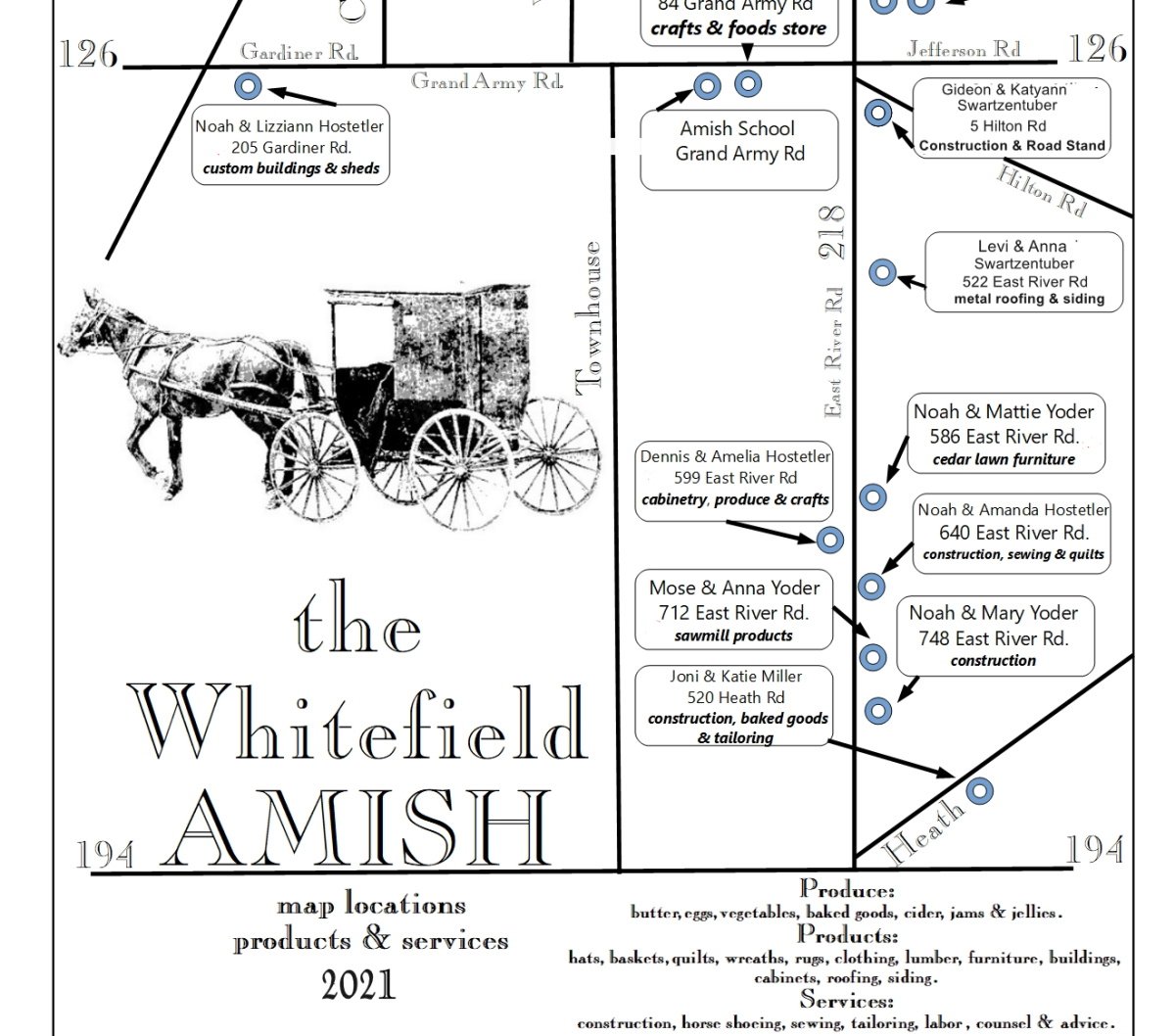
Like in other regions, Amish settlers in the state have developed thriving small businesses, reflecting the diversity of Amish occupations in the 21st century. While some Amish continue to make a living in traditional farming, many do not.
Amish have found a ready market for their products, and for the most part (with rare exceptions), have been welcomed by the non-Amish residents of Maine. If the current communities continue to show that New England can work for the Amish, perhaps more will look to the region when considering new home locations in future.
Maine Amish Video
In this video, you’ll see footage of several Amish locations in Aroostook County, Maine, including the Smyrna Mills and Fort Fairfield areas.
For further information, see:
- “Putting Down Roots: Amish find a home in rugged Maine”, Boston Globe, Sarah Schweitzer, February 2, 2005
- “Profiles in Rural Maine”, allmainematters.com, Ken Anderson, Vol. 1 No. 9, September 2006
- “The Christian Communities: A Brotherhood of Covenant and Commitment” by Bryce Geiser, Old Order Notes, 321 Spring Summer 2000
- New York Amish: Life in the Plain Communities of the Empire State by Karen Johnson-Weiner
- “Fort Fairfield and Easton Welcome Amish Families to Their Communities”, Fort Fairfield Journal, David Deschesne
- “Amish in Fort Fairfield”, March 17, 2011, WLBZ2
- “Amish families reviving farms in Thorndike, Unity”, Bangor Daily News, Walter Griffin, October 23, 2009
- “Living in Unity”, Boston Globe, Sarah Schweitzer, November 29, 2009
- “Maine’s latest immigrants: Amish”, Morning Sentinel, David Leaming, March 17, 2010
- The New American Almanac, Raber’s Bookstore (Baltic, Ohio), Ben J. Raber
- “Amish Population, 2023” Young Center for Anabaptist and Pietist Studies, Elizabethtown College
- “Amish Population in the United States by State, County, and Settlement, 2023” – compiled by Edsel Burdge, Joseph F. Donnermeyer, and Adam Hershberger


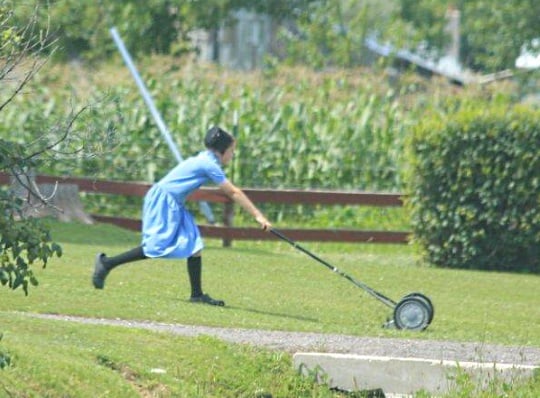
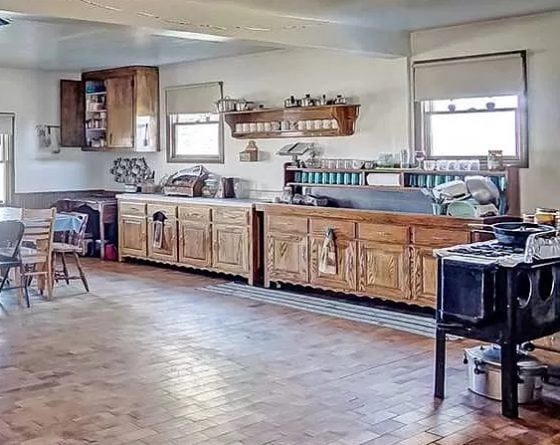
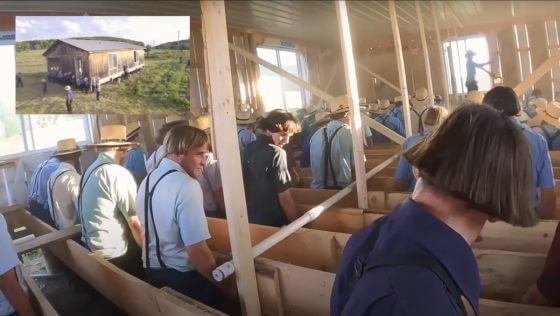

American Artist, Amish Content
I am an American Painter of some renown. I am very interested in to know if there would be an Amish Community in Main where I might be able to live amongst, or at least visit and interact a number of days each week, for a period of a few months, preferably in the summer. I am also willing to work a couple of days a week in whatever capacity needed, to broaden my experience. I wish to do a whole series of paintings about the people, their culture, and my experiences there. I am respectful, and willing to abide by any rules or requirements set forth by the community, and would welcome any suggestions.
Amish settlements in Maine.
I’m from Lancaster County, Pennsylvania, which is famous for “Old Order Amish”. Some have made the move to Houlton, Maine. Other settlements areas are Smyrna, Fort Fairfield, and Unity. These Amish are from all over our nation and looking for cheaper land to farm. This area is in the northernmost area in Maine right on the Canadian border. The Amish are very entrepreneurial with not just farming, but green-housing, shed-building, etc. I’m not Amish, but I have Amish relatives who moved to this area.
Amish blogging
I thought it was strange to see a blog about the Amish. They don’t have computers! So who is running this blog? I am a 59 year old nurse thinking about joining an Amish community. I live in Massachusetts so Maine is the closest. I am a born again Christian so I am accustomed to their beliefs and baptism. I got baptized in 2010. Not sure about speaking German though. They live in America, they may be Amish but they are also Americans. Americans speak English. I’m not willing to do otherwise. It’s a patriotic thing I have. I believe in having ancestry, that’s important. But when you decide to live in America, you speak American. I was born here and I will die here and I will speak English. They don’t talk much about healthcare except that they take trips to the hospital. I am a nurse of 38 years. Can’t I work for them and take care of them as a nurse? I also cook and bake. I am wondering what restrictions they have on ingredients other than alcohol of course.
So… you are thinking about joining the Amish but have already decided a large part of the culture – the language – is not going to work for you. (And Americans DO speak many languages, or are you saying immigrants who don’t immediately drop their language are not really Americans? That could really open up a can of worms and start a discussion on America’s history.) Anyhow, so in deciding you won’t speak German because of your patriotic beliefs you are not going to read the history & religious writings, understand sermons or hymns, converse with children who might not yet know English, or grasp all of the casual conversations going on around you? Joining another culture can be challenging enough — doing so while choosing to isolate yourself linguistically is almost impossible.
I can and do speak English. (I write it, too. :)) But within our community, I speak the dialect. Knowing more than one language enriches a person. (As I believe is the idea behind teaching other languages besides English in the public schools.)
Americans speak English? I do, but I also speak another language. I am born & raised here and expect to die here, but I also appreciate my heritage and culture! What a puzzling attitude for someone wishing to become Amish. I’m starting to get why the Amish are wary of people who want to join them out of the blue.
I agree with you.
Too many people see Amish as a fad, they do not realize the hard work and dedication it takes to be one of these very unique people. It is saddens me to see this sort of thing. Being Amish takes a very special person.
I fear you are not committed
It appears to me, reading your statement that you are chasing a dream and not committed to the cause. You are seeking a slower quieter world, not the hard and dedicated life of the Amish. Amish do not get involved in politics, do not show patriotism, or practice the Christianity you are “born again” to. You do more than bake and cook, you will be growing food-animals and you don’t go to the store when you need meat or veggie. You will be sewing your own clothes. Laundry is done with homemade soap and if you are lucky with a ringer washer run on a generator. Your walls will be barren of photos art or decorations. You will heat with wood that YOU carry in after cutting and splitting. You cook on a wood stove. The language is an important part of the community and heritage. I would say, reading what you posted you are more set to be an off girder than a member of the Amish community. As far as being a nurse, yes it maybe helpful however Amish are strongly natural-herbal medicine. Minimal encounters with modern medicine. I hope this will help you in your decision. FYI, we have been close friends with several Amish families for years and am sharing this info with you based on our knowledge of these fascinating and loving people.
The Seeker's Quandry
Your desire, Christine, is plausible. People have gone Amish and stayed. It is possible but extremely difficult. Be prepared to deal with requirements that are not, to your way of thinking, scripturally defendable but upon which your acceptance and membership hinge. Listen closely to what Mark and Natalie said. It will cost you more than you can possibly anticipate. If you wish to dive into the mechanics of culture, Christianity, and seekers, I recommend this book which just came out:
https://www.amazon.com/No-Greater-Burden-Perspecive-Anabaptist/dp/0692074996/ref=sr_1_1?ie=UTF8&qid=1522526962&sr=8-1&keywords=No+greater+burden
Amish
If you wish to do everthing the hard way live in a cult environment where everyone worries what the deacon thinks, or the pope! Become amish and expect to do womens work
Browning , Vermont Amish
We have a community of Amish living in Brownington Vermont for the pass few years. It would be closer then Maine for you.
Extended Stay
Would this mean that it would be possible to live/work amoungst your community in the future for reference information for my artwork??? Interested.
I Totally agree with Mark, Natalie, and Will
If you want to become Amish then it is 100%, you adapt to their culture and not that they adapt to what you want them to be.
I Respect the Amish very much what they do (culturally, tradition, Faith, their inventiveness and etc). Because of my respect to the Amish, I have never asked them if I could join them!
The more Languages you know the better. In the German speaking part of Switzerland the Dialects is the Spoken Language and High German is learned in School so is French, Italian, or Raetoromanisch (which is a descendant of the spoken Latin Language and it is spoken in parts of the Canton of Grisons or in german Graubuenden). And when I came to North America I learned English. Pennylvannia Deutsch is an American Language same as French is for Quebec Canada or Spanish for some parts of the US.
Very well said, Urs. your first paragraph is quote-worthy!
Does the Amish Community offer cooking class's?
Do any one in the Amish Community offer cooking classes? I personally would love to try my hand at a few dishes?
Hi: So there are two other newer communities here in Maine that I know of: One in Smithfield which are Black Top Amish, and one in Whitefield which is older and bigger.
Amish in Whitefield Maine
We currently have at least five families, here now in Whitefield. They have been good respectful, quiet neighbors. Mr. Yoder has re-opened a local sawmill on RT 218N, while another gentleman has begun a small shed/storage/outhouse business on RT 126W. The local farms they’ve moved into are coming back to life and that’s so very wonderful to see. Three of those farms have small stands where they sell homemade jelly/jam, pickles, pastries and other foods. Fresh handmade yeast bread and many types of vegetables from their gardens. One sold cantaloupe and watermelon last summer as well. The family that has settled into what has been known as Norman Chases Farm or Happy Farm on Rt126W by the Sheepscot River bridge (near the Whitefield Elementary School) by locals, sells handmade quilts, baskets and straw hats as well as farm made food and preserves. A fresh vege stand on Rt218S also sells preserves and Pickle’s made on site. Just past that Amish farm lies another on the opposite side of 218S,headed toward Alna and
Wiscasset. They also sell fresh breaf and other lovely things made on site at the farm. It’s a lovely ride on a bright sunny Saturday to check out these places and meet our newest Whitefield Amish farmers.
Relocatig
My husband and I purchased property in Sebec Maine last year and are about to build our home this summer. I would love to see some Amish families locate to our area, at least we’d know we have peaceful hard working neighbors moving in.
Amish
We have many Amish families here in Somerset county. I love their fresh garden stands they have and I love buying local supporting my local farmers. They are very polite and very dedicated to their lifestyle.
Growing Whitefield Amish community
You might be interested in this Album of the now MUCH larger Amish community of Old Order Amish at Whitefield.
https://photos.app.goo.gl/3AGVq1VpZtY4YbGB7
Lovely photos!
Thank you, lovely photos. Joan Gibson, Levant, Maine
research request
am a writer currently engaged in preliminary research for a book about eating and appetite, and the impact that particular circumstances- spiritual, physiological, situational and geographical- have on cooking and eating, both for the individual and community.
One of the chapters will focus on spiritual and religious communities and I wondered if it might be possible to be put into contact with representatives of the Amish communities in various states for the purpose of eventually interviewing them/spending time locally. I would also love to talk to any member of the Amish or Mennonnite community about their cooking, growing and eating lives and I have included my email below.
I will also be talking to Muslim food writers and chefs about Ramadan and how they cope when their careers are so food-focused and people who have converted to Judaism, exploring how illnesses such as diabetes affect participation in rituals of fasting and feasting.
Thank you so much in advance,
Nicola Miller nicmillerwriter@gmail.com
40 acre farm for sale in Palmyra Me
Would like to see an Amish Family take over this small farm. All cleared land very good soil..3 bedroom house with attached barn a storage shed Maple Syrup she’d complete with evaporator..
equine
would love to know who to contact to see about purchasing some of the Amish horses and mules that are no longer needed due to age/health. No judgement, just would like to see if i could purchase a few before they went to auction.
Growing Whitefield Amish community
http://www.mainething.com/amish/
Business opportunity
I am the sales manager for an industrial lubricant company. We have many Amish that use our lubricants as well as resell them I am trying to get in contact with someone in Maine that would want to learn more about our lubricants as well as be a distributor. Please email me or call me at 208-251-8156
Growing number of Amish communities
Amish America needs to update on the current number of Amish communities in Maine. Smyrna, Unity, Wales, and now Hiram are all related. Besides Houlton and Fort Fairfield, a community has sprung up in Island falls. Then you have Whitefield, and the more recently established Palmyra community. An update is greatly needed.
Please help me understand
I hope my question doesn’t sound disrespectful or condemning to the Amish. I’m truly just trying to understand the other side. Let me start at the beginning. I’ve always loved horses while growing up in the 1980’s. However my family was not able to afford a horse so I would clean stalks, feed, water, brush basically do any work needed for the wealthy folks horses so I might be able to get a riding lesson at half the rate.
Now I’m 51 and can afford lessons but I’ve found as I get older learning how to drive a carriage is more my speed now. I’ve been looking into buying a driving pony and in the process of looking for a horse stumbled across the sad and horrible world of slaughter auctions for horses, donkeys, mules etc.
I’m so sadden by this new knowledge and when I looked into it further I came to realize most of the animals are from the Amish. I was absolutely shocked because I always thought they respected life of all kinds. To my surprise I was told animals are just disposable to the Amish. As soon as a pony can’t run as fast or perform as well as before they are sent to the slaughter auction paid for pound for pound to the highest bidder.
How can a family have a devoted beast do all that is asked of them and then be tossed to the trash like a broken car? My heart was broken when I learned of this. If only I could afford to let these gentle servants retire to a pasture until they pass away peacefully and naturally. These animals showed dedication to their families and doing all that was asked of them. How could anyone toss an animal so dutiful into a trash heap? I guess my question is #1. Is this true? Do the Amish toss out their animals when they can’t perform as well as they could when the animal was younger? And second if that is true then how is getting a newer faster pony any different than being boastful and being full of pride? I would think to show you are humble would be to show kindness towards a slower, older pony and treating it well and making it live humanly until his last breath. Why is it okay to just get rid of innocent animals in a horrible evil way like a slaughter house. The Amish should know that Christian kindness extends towards helpless animals too. I have been giving donations to Equine Rescue Network in Middleton MA. that goes to the slaughter actions and buys horses to rehabilitate. Once the bought animal is healthy and back to trusting people the animal is put up for adoption. Kind humanitarian people will adopt them and give them a place to live out their lives until they pass away naturally. Many of the Amish animals (goats, ponies, minis, donkeys, draft horses etc) are so beaten down that they no longer can be ridden or driven. Some are so beaten that it takes months and months of rehab to get theses animals to trust a human again. Please explain to me why the Amish do this?
Not all...
Do all “English” (aka non-Amish) American’s beat their animals? Do they ALL treat them as part of the family? Nope. The same for the Amish (and Mennonites and Hutterites too.) They are just as diverse as you and your town are. There is definitely some issue in some Amish communities on crimes against animals, and even worse crimes than that. Some run horrid puppy mills and they’re fairly open about it if you ask them. Here in Maine, I saw a grown man show me a foal born early that morning and get tears in his eyes and praise God! The Amish certainly see things differently than we do in many ways, but the communities are all very diverse. Many do see animals as tools though, that would have been typical of our grandparents’ generation that farmed too. But MANY Amish treat animals with respect throughout their life. Do not believe rumors, please.
My apologies
Thank you for your thoughtful explanation. I should not have assumed that all Amish are of the same mindset. I appreciate your honest and open reply. I’m sorry I was not thinking about the good points you made before writing my first message. I’ll think first before assuming rumors are truth. My apologies to any anyone I offended.
Barns
I live in central Maine and have heard of some barns that were built by the Amish community. I’d love to have one built for this old farmstead I live on. How do I go about having that happen?
Best place to visit Amish for my son
Hi everyone. My son and I used to live in Lebanon, PA near Lancaster about three years ago. We now live in Londonderry NH. He is 20 years old, non-verbal with severe autism. He LOVES watching the horse and buggies. We used to hang out at BB’s and Hornings in Lebanon County to shop and see all the sights. Now that we moved to NH, I was wondering which community would be the best to see the Amish closer to us. There are communities in Vermont and Maine. Nothing will compare to the Lancaster area but the six hour drive is something I’d rather avoid for now. Any ideas which community work be best for us to visit? I think they’re both around a three or four hour drive compared to the six hour drive to PA. Thanks!
Roofers
How far are you from Charleston Maine
Amish in Vermont
Maine is not the only NE State some Amish call home. Since 2015 quite a large community of Amish have settled around Browington, VT.
Amish in Lincoln Co., Maine
there’s a growing and thriving community of Schwartzentruber Amish in mid-coast Maine in the town of Whitefield. It has grown considerably since this article was published in the “Lincoln County News” six years ago:
https://lcnme.com/currentnews/amish-families-bring-new-culture-shared-goals-whitefield/